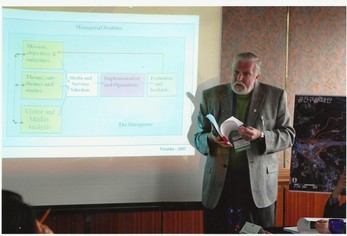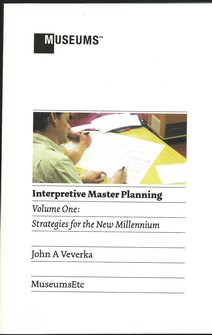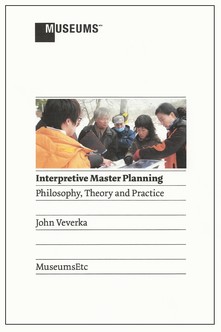John Veverka & Associates
Main menu
- Home Page
- Our Range of Services
- Separator 2
- Interpretive Coaching
- Interpretive Planning
- Interpretive Plan Outline
- Interpretive Training
- John Veverka Resume
- Qualifications
- NEW Advanced Interp. Text Book
- Separator 11
- InterpNEWS
- Separator 12
- Library
- Expert in Interpretation
- JVA NEWS, Courses and Updates
- Certificates
- Separator 47
- Planning/Design of Interpretive Panels
- Separator 48
- Interpretive Writing
- Separator 49
- Interpretive Writing Course
- Separator 50
- Interpretive Trails Course
- Separator 56
- Interpretive Panels Course
- Separator 55
- Introduction to Heritage Interpretation Course
- Separator 54
- Interpretive Planning & Design of Marketing Brochures Course
- Training for Interp. Trainers
- Separator 57
- Interpretive Exhibits Course
- Separator 58
- Interpretive Master Planning Course
- Separator 59
- Interpretive Planning for Scenic Byways.
- Critiquing and Coaching Interpretive Staff
- Separator 31
- Advanced Interpretive Planning
- Interpretive Training Center Course Catalogue
- Separator 32
- Interp. for International Visitors course.
- Separator 33
- Interpretive Exhibits Evaluation
- Separator 34
- Interp. Center Feasibility Analysis Course.
- Separator 35
- Interp. for Commercial Tour Providers
- Separator 36
- Interpretive Researchers Guide for Visitor Studies
- Separator 37
- Separator 13
- Interp. Planning for Historic Homes
- Separator 14
- Heritage Interpretation Training Center
- Interpretive Planning for Botanical Gardens
- Separator 15
- An introduction to planning and presenting live interpretive programs and tours for Museum/Heritage Site Docents and Volunteers.
- Developing Marketing Plans for Heritage & Tourism Sites and Attractions
- Separator 16
- Interpretation Book Store
- Separator 17
- Heritage Interpretation Resource Center
- Interpretive Planning for Historic Farms
- Developing Successful Partnerships
- Developing Interpretive Outreach Programs
- Community Interpretation Planning
- Interpreting Gravestones and Historic Cemeteries
- Using Interpretation to Accomplish Management Objectives.
- An Interpreters Guide for Survival Economics.
- Separator 18
- Innovative Strategies for Interpretive Media and Services Planning.
- Separator 19
- A Curators Guide for Developing Gallery Tours.
- Advanced Interpretive Writing - Technical Publications
- Page 2
- Advanced Interpretive Services for Managers, Supervisors, Team Leaders and Sr. Staff.
- Separator 20
- Advanced Interpretation for Chiefs of Interp. - Interpretive Managers - Regional Interp. Specialists
- Interpreting Critical Issues.
- Separator 21
- Developing Commercial Interpretation for Resorts, Cruise Ships, Campgrounds and Tourism Attractions.
- Separator 38
- Planning and developing a new commercial tour guiding business.
- Separator 39
- Interpretive Evaluation, Visitor Studies and Site Assessment Center
- Separator 40
- The Center for Interpretive Planning Advancement & Excellence.
- Developing Requests for Proposals (RFPs)
- Separator 41
- Planning and Facilitating Focus Workshops
- Separator 42
- InterpNEWS Advertising Details
- Planning for Interpretive Experiences
- 40 Years a Heritage Interpreter
- Separator 43
- Interpretive Techniques - The Rest of the Story Course
- Separator 44
- Certified Professional Interpretive Planner Certificate
- Certified Professional Interpretive Program
- Certified Professional Interpretive Trainer certificate program.
- Separator 53
- Certified Professional Heritage Interpreter certificate program.
- Separator 52
- Certified Professional Interpretive Writer certificate program.
- Visitor motives for attending interpretive programs.
- Separator 45
- Exhibit Rehab Course
- Separator 46
- Developing Training Workbooks & Manuals
- Separator 22
- Planning for Railroad Museums and Sites.
- Separator 51
- Climate Change Interpretation Course.
- Separator 23
- When there's nothing left but the story - interp. storytelling.
- Separator 24
- Interpreting Legends Myths and Fables
- Separator 25
- InterpSHARE - Seminars 2022
- Separator 26
- Interpreting Invasive Species
- Separator 27
- Interpretiing Edible Insects
- Separator 28
- Interpretaive Planning for Climate Change
- Separator 29
- HITC Climate Crisis Resource Center
- Separator 30
- Separator 5
- PUP Members Only
- Starting a new Interp Consulting Business
- Panels 4 Week Course
- Separator 8
- Interpretive Writing - 4 Week Course
- Marketing - 4 Week Course
- Separator 7
- Intro to Interpretation - 4 Week Course
- Separator 9
- Interp Climate Change - 4 Week Course
- Separator 10
- Exhibit Rehab 4-Week Course
- Separator 6
- Level 1
- Johns Interpreters Blog
- Separator 4
- Economics for Heritage Interpreters
Interpretive Master Planning Course
Interpretive Master Planning
13 Units - 3 CEU credits
An advanced interpretive training course.
JVA is pleased to announce the development of our updated for 2023 e-Live interpretive training courses offered by Professor John Veverka.
Note: I do about 5 interpretive planning projects a year (for the past 40 years). Course content is based on "real" interpretive planning projects including current and recent interpretive planning projects. We do what we teach... and teach what we do.
Before you start this course meet me at: https://youtu.be/qmFpZ2R7UJA

Interpretive planning seminar, Korea.
Resources you will be provided with:
* John Veverkas new (2013) college textbook Two Volume Interpretive Planning e-book Set:
* Interpretive Master Planning - Strategies for the New Millennium
* Interpretive Master Planning - Philosophy, Theory and Practice.
* E-book copy of "The Interpretive Trails Book" (MuseumsETC -January 2015).
* Copies of Interpretive Graphic Standards for outdoor panels.
* Copies of completed JVA Interpretive Master Plans as examples.
* Additional handout materials.


Who is this course for?
* Individuals, agencies or organizations that may currently be involved with an interpretive
master planning project.
* Individuals, agencies or organizations that are planning on developing an interpretive master
plan in the future for their site or organization.
* Individuals offering interpretive planning services who do not possess a college level degree in
interpretive services or who have not had any formal training in interpretive master planning.
* Any individual interested in advancing their knowledge and skill level in heritage
interpretation planning.
It is highly recommended that any individual considering taking this course have had some background training in interpretive services and/or extensive field experience in interpretive services.
Note: The average cost of having a consultant complete an Interpretive Master Plan is about $8000.00 depending on the scope of work. This course will:
* Guide you in developing your interpretive plan yourself.
* Give you expertise in being an interpretive planning project manager.
* Give you direction is writing a Request for Proposal for hiring a consultant to do an
interpretive master plan for you.
* Give you specific details of what should be in an Interpretive Master Plan.
* Give you a skill level in reviewing draft interpretive master plans.
Course Goals:
Participants will:
- Understand the model of Interpretive Planning
- Understand all the components of the Interpretive Planning Content Outline.
- Gain an understanding of developing a comprehensive interpretive theme and objectives for the total interpretive site.
- Learn the importance of developing an interpretive story-line flow chart.
- Learn how to develop standard interpretive site inventory and story development forms.
- Develop a 5 year implementation phasing strategy and implementation budget.
- Gain an understanding to the total interpretive planning process interpretive media would be
apart of.
- Understand how understanding your market groups affect your interpretive plan media, topics
and services planning.
- Feel confident in planning and designing successful interpretive master plans for excellent
future interpretive experiences for your market groups.
Your final project for this course will be:
Develop an interpretive master plan working draft for a park, historic site, botanical garden, zoo or commercial heritage site or attraction.
About the Instructor: Prof. John Veverka
Interpretive planning - Nine Mile Canyon, Utah.
- B.S and M.S in Heritage Interpretation - The Ohio State University (Taught a course on
Interpretive Master Planning - wrote the first Interpretive Planning Text book).
- Ph.D. program in Interpretation at Michigan State University. (Taught introduction and
advanced interpretive courses including interpretive planning units.)
- Adjunct Professor Heritage Interpretation (summer heritage tourism institutes) North
Carolina State University, New York State University.
- NAI Certified Interpretive Planner and Trainer
- NAI Fellow
- Certified Professional Heritage Interpreter (Canada).
- Author of several interpretive planning/training college text books.
- Publisher of InterpNEWS - the International Heritage Interpretation e-Magazine.
- 40 years of interpretive planning, training and writing experience.
What are the units?
Unit One - An overview and review of the Interpretive Planning Model and interpretive
plan content outline.
Unit Two - Interpretive Planning Outcomes. What are the objectives you want the
interpretive plan to accomplish, and what is your main over-arching
interpretive theme that all interpretation for your total site needs to work to
illustrate?
Unit Three - Interpretive Resource Inventory - what is your story, what is the story your
landscape or site is really illustrating.
` * Inventory of Interpretive Experiences.
* Inventory of Current interpretive products or services.
* Developing your site inventory location map.
Unit Four - Your market analysis.
* Who are your current market groups.
* What market groups do you want to add?
* What are the kinds of experiences you feel that your visitors want.
* Conducting visitor surveys.
* Visitor motivations for selecting and attending interpretive programs and
services.
Unit Five - Markets of One and Mass Customization - one size does not fit all.
Unit Six - Planning for Interpretive Panels - overview of materials and costs.
Unit Seven- Planning for Interpretive Trails (new or existing trail updating).
Unit Eight - Planning to update or add visitor center exhibits.
Unit Nine - New visitor center feasibility analysis.
Unit Ten - Developing Individual Interpretive site/feature interpretive assessment and story
development form sets.
Unit Eleven - Developing your 5-year project implementation phasing strategy and
implementation budget.
Unit 12 - Evaluation and pre-testing recommendations.
Unit 13 - Final project - your interpretive master plan draft (if you are working on a
actual interpretive planning project) or interpretive trail panning outline/check-
list if you will be working on a interpretive plan in the future.
Estimated time to complete this course is 30 hours but you can take your time if you are working on a planning project using the course as your guide.
When will the course start? You can start this course at any time and work at your own pace. It is estimated that it will take about 30 hours to complete this course. The cost of the 30 hours of training is $275.00 USD, which can be paid for by credit card or PayPal below.
John Veverka
jvainterp@aol.com
SKYPE: jvainterp
Phone: 517/803-6605